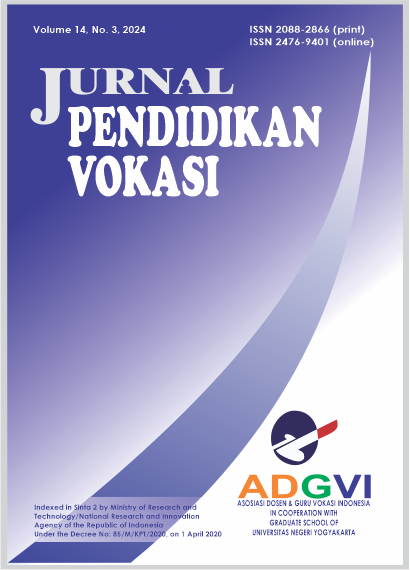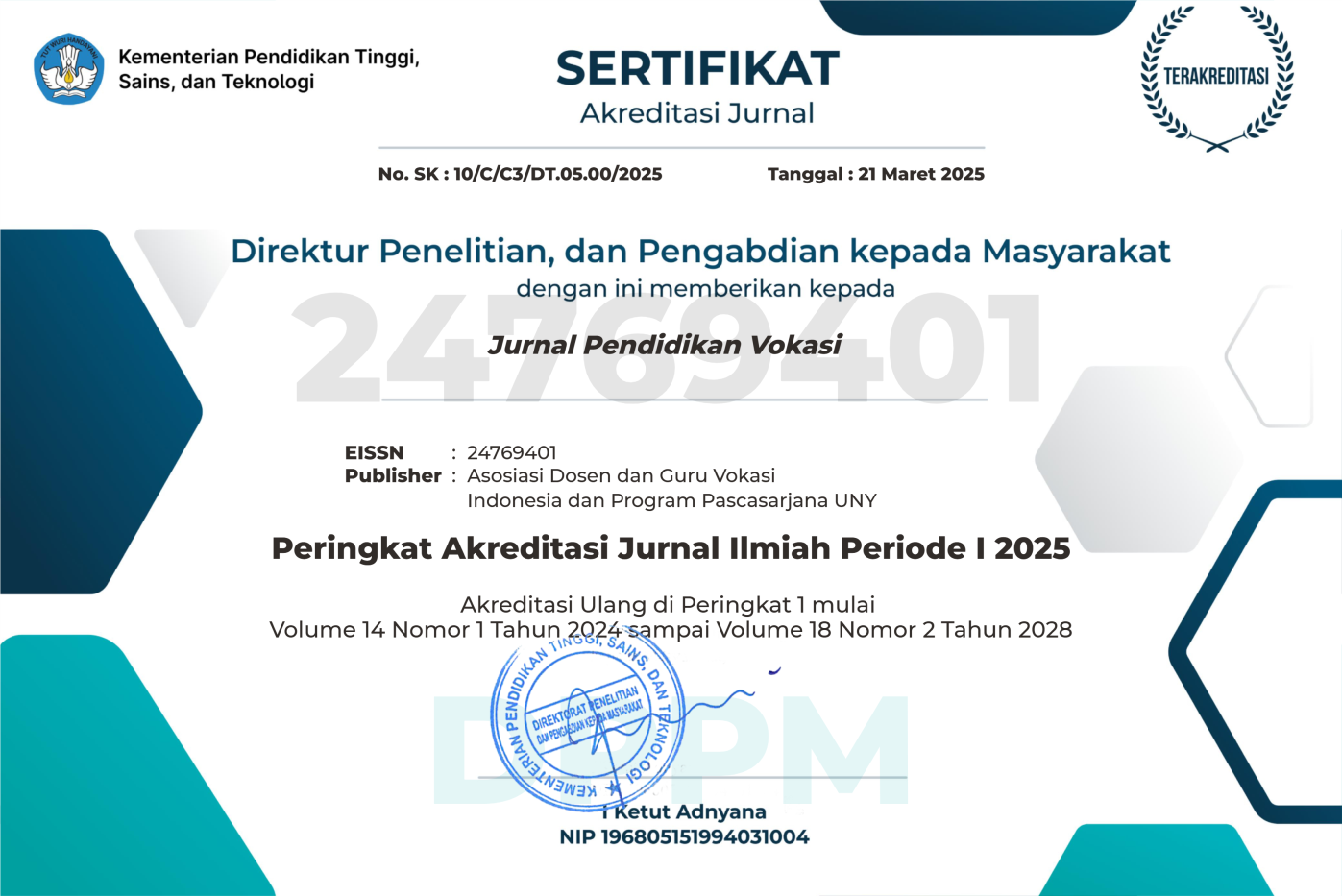Enhancing digital competence and entrepreneurial orientation in vocational education: Innovations for SMEs in West Java's fashion industry
DOI:
https://doi.org/10.21831/jpv.v14i3.72376Keywords:
Business success, Digital competence, Digital entrepreneurial competence, Digital entrepreneurial orientation, Digital innovation, Vocational educationAbstract
The creative economy is vital for Indonesia's economic growth, especially during a global slowdown. It boosts employment and export values, with culinary, crafts, and fashion leading the way. In 2022, fashion, culinary, and crafts had the highest export values. West Java is a standout province in this industry. The UMKM Juara program aims to expand markets and digitalize MSMEs. Technology and digital tools are reshaping the business landscape, and the creative industry must embrace these advancements to succeed financially. The purpose of this study was to investigate the effect of digital innovation on business success as a mediator between digital entrepreneurship competence and digital entrepreneurship orientation. The methodology employed was descriptive verification with a quantitative approach. Data were collected using questionnaires. The sampling technique employed was non-probability sampling with purposive sampling, yielding a sample of 306 West Java UMKM Juara in the Fashion Subsector. SEM-AMOS was used to analyze the data in this research. The research findings revealed that digital entrepreneurship competence had a direct and positive effect on business success. Likewise, digital entrepreneurship orientation had a positive effect on business success. Digital innovation mediated digital entrepreneurship competence towards business success. However, digital innovation did not mediate digital entrepreneurship orientation on Business Success. This findings can be used to improve vocational education curricula or strengthen training programs related to developing digital competencies among learners.
References
Arabeche, Z., Soudani, A., Brahmi, M., Aldieri, L., Vinci, C. P., & Abdelli, M. E. A. (2022). Entrepreneurial orientation, organizational culture and business performance in SMES: Evidence from emerging economy. Sustainability, 14(9), 5160. https://doi.org/10.3390/su14095160
Baron, R. M., & Kenny, D. A. (1986). The moderator–mediator variable distinction in social psychological research: Conceptual, strategic, and statistical considerations. Journal of Personality and Social Psychology, 51(6), 1173–1182. https://doi.org/10.1037/0022-3514.51.6.1173
Bird, B. (2019). Chapter 6 toward a theory of entrepreneurial competency. In Seminal ideas for the next twenty-five years of advances (pp. 115–131). Emerald Publishing Limited. https://doi.org/10.1108/S1074-754020190000021011
Brouthers, K. D., Nakos, G., & Dimitratos, P. (2015). SME entrepreneurial orientation, international performance, and the moderating role of strategic alliances. Entrepreneurship Theory and Practice, 39(5), 1161–1187. https://doi.org/10.1111/etap.12101
Cenamor, J., Parida, V., & Wincent, J. (2019). How entrepreneurial SMEs compete through digital platforms: The roles of digital platform capability, network capability and ambidexterity. Journal of Business Research, 100, 196–206. https://doi.org/10.1016/j.jbusres.2019.03.035
Chaganti, R. (Raj) S., Watts, A. D., Chaganti, R., & Zimmerman-Treichel, M. (2008). Ethnic-immigrants in founding teams: Effects on prospector strategy and performance in new Internet ventures. Journal of Business Venturing, 23(1), 113–139. https://doi.org/10.1016/j.jbusvent.2006.07.004
Chatterjee, S., Chaudhuri, R., Shah, M., & Maheshwari, P. (2022). Big data driven innovation for sustaining SME supply chain operation in post COVID-19 scenario: Moderating role of SME technology leadership. Computers & Industrial Engineering, 168, 108058. https://doi.org/10.1016/j.cie.2022.108058
Covin, J. G., & Slevin, D. P. (1991). A conceptual model of entrepreneurship as firm behavior. Entrepreneurship Theory and Practice, 16(1), 7–26. https://doi.org/10.1177/104225879101600102
Daradkeh, M., & Mansoor, W. (2023). The impact of network orientation and entrepreneurial orientation on startup innovation and performance in emerging economies: The moderating role of strategic flexibility. Journal of Open Innovation: Technology, Market, and Complexity, 9(1), 100004. https://doi.org/10.1016/j.joitmc.2023.02.001
Dimitratos, P., Lioukas, S., & Carter, S. (2004). The relationship between entrepreneurship and international performance: The importance of domestic environment. International Business Review, 13(1), 19–41. https://doi.org/10.1016/j.ibusrev.2003.08.001
Drydakis, N. (2022). Improving entrepreneurs’ digital skills and firms’ digital competencies through business apps training: A study of small firms. Sustainability, 14(8), 4417. https://doi.org/10.3390/su14084417
Esposito, C., Ficco, M., Castiglione, A., Palmieri, F., & Lu, H. (2018). Loss-tolerant event communications within industrial internet of things by leveraging on game theoretic intelligence. IEEE Internet of Things Journal, 5(3), 1679–1689. https://doi.org/10.1109/JIOT.2017.2782264
Gil-Gomez, H., Guerola-Navarro, V., Oltra-Badenes, R., & Lozano-Quilis, J. A. (2020). Customer relationship management: Digital transformation and sustainable business model innovation. Economic Research-Ekonomska Istraživanja, 33(1), 2733–2750. https://doi.org/10.1080/1331677X.2019.1676283
Ginsberg, B. (2011). The fall of the faculty. Oxford University Press. https://doi.org/10.1093/oso/9780199782444.001.0001
Guo, R., Cai, L., & Zhang, W. (2016). Effectuation and causation in new internet venture growth. Internet Research, 26(2), 460–483. https://doi.org/10.1108/IntR-01-2015-0003
Hafeez, M. H., Shariff, M. N. M., & Lazim, H. bin M. (2012). Relationship between entrepreneurial orientation, firm resources, SME branding and firm’s performance: Is innovation the missing link? American Journal of Industrial and Business Management, 2(4), 153–159. https://doi.org/10.4236/ajibm.2012.24020
Hair, J. F., Black, W. C., Babin, B. J., & Anderson, R. E. (2019). Multivariate data analysis. Cengage.
Horváth, D., & Szabó, R. Z. (2019). Driving forces and barriers of Industry 4.0: Do multinational and small and medium-sized companies have equal opportunities? Technological Forecasting and Social Change, 146, 119–132. https://doi.org/10.1016/j.techfore.2019.05.021
Howkins, J. (2001). The creative economy: How people make money from ideas. Allen Lane.
Huang, S. K., & Wang, Y.-L. (2011). Entrepreneurial orientation, learning orientation, and innovation in small and medium enterprises. Procedia - Social and Behavioral Sciences, 24, 563–570. https://doi.org/10.1016/j.sbspro.2011.09.004
Ismail, I. J. (2022). Entrepreneurs’ competencies and sustainability of small and medium enterprises in Tanzania. A mediating effect of entrepreneurial innovations. Cogent Business & Management, 9(1). https://doi.org/10.1080/23311975.2022.2111036
Jahanmir, S. F., & Cavadas, J. (2018). Factors affecting late adoption of digital innovations. Journal of Business Research, 88, 337–343. https://doi.org/10.1016/j.jbusres.2018.01.058
Jones, C., & English, J. (2004). A contemporary approach to entrepreneurship education. Education + Training, 46(8/9), 416–423. https://doi.org/10.1108/00400910410569533
Khin, S., & Ho, T. C. (2019). Digital technology, digital capability and organizational performance. International Journal of Innovation Science, 11(2), 177–195. https://doi.org/10.1108/IJIS-08-2018-0083
Kindermann, B., Beutel, S., Garcia de Lomana, G., Strese, S., Bendig, D., & Brettel, M. (2021). Digital orientation: Conceptualization and operationalization of a new strategic orientation. European Management Journal, 39(5), 645–657. https://doi.org/10.1016/j.emj.2020.10.009
Koliby, I. S. M. Al, Abdullah, H. H., & Suki, N. M. (2024). Linking entrepreneurial competencies, innovation and sustainable performance of manufacturing SMEs. Asia-Pacific Journal of Business Administration, 16(1), 21–40. https://doi.org/10.1108/APJBA-09-2021-0480
Kraus, S., Rigtering, J. P. C., Hughes, M., & Hosman, V. (2012). Entrepreneurial orientation and the business performance of SMEs: A quantitative study from the Netherlands. Review of Managerial Science, 6(2), 161–182. https://doi.org/10.1007/s11846-011-0062-9
Kuriloff, A. H., Hemphill, J. M., & Cloud, D. (1993). Starting and managing the small business. McGraw-Hill.
Linton, G., & Kask, J. (2017). Configurations of entrepreneurial orientation and competitive strategy for high performance. Journal of Business Research, 70, 168–176. https://doi.org/10.1016/j.jbusres.2016.08.022
Lumpkin, G. T., & Dess, G. G. (2001). Linking two dimensions of entrepreneurial orientation to firm performance. Journal of Business Venturing, 16(5), 429–451. https://doi.org/10.1016/S0883-9026(00)00048-3
Miller, D., & Friesen, P. H. (1978). Archetypes of strategy formulation. Management Science, 24(9), 921–933. https://doi.org/10.1287/mnsc.24.9.921
Ngoasong, M. Z. (2018). Digital entrepreneurship in a resource-scarce context. Journal of Small Business and Enterprise Development, 25(3), 483–500. https://doi.org/10.1108/JSBED-01-2017-0014
Nielsen, C., Lund, M., Thomsen, P. P., Kristiansen, K. B., Sort, J. C., Byrge, C., Roslender, R., Schaper, S., Montemari, M., Delmar, A. C. P., Simoni, L., Paolone, F., Massaro, M., & Dumay, J. (2018). Depicting a performative research agenda. Journal of Business Models, 6(2), 59–64. https://vbn.aau.dk/files/292808460/2018_Nielsen_et_al.pdf
Oberländer, M., Beinicke, A., & Bipp, T. (2020). Digital competencies: A review of the literature and applications in the workplace. Computers & Education, 146, 103752. https://doi.org/10.1016/j.compedu.2019.103752
Pan, Y., Zhang, S., & Zhang, M. (2024). The impact of entrepreneurship of farmers on agriculture and rural economic growth: Innovation-driven perspective. Innovation and Green Development, 3(1), 100093. https://doi.org/10.1016/j.igd.2023.100093
Paños-Castro, J., & Arruti, A. (2021). Innovation and entrepreneurship in education, irreconcilable differences? A first approach through Spanish expert judgment. International Journal of Innovation Science, 13(3), 299–313. https://doi.org/10.1108/IJIS-07-2020-0106
Permatasari, A., & Anggadwita, G. (2019). Digital entrepreneurship education in emerging countries. In P. O. de Pablos, M. D. Lytras, X. Zhang, & K. T. Chui (Eds.), Opening Up Education for Inclusivity Across Digital Economies and Societies (pp. 156–169). IGI Global. https://doi.org/10.4018/978-1-5225-7473-6.ch008
Quinton, S., Canhoto, A., Molinillo, S., Pera, R., & Budhathoki, T. (2018). Conceptualising a digital orientation: Antecedents of supporting SME performance in the digital economy. Journal of Strategic Marketing, 26(5), 427–439. https://doi.org/10.1080/0965254X.2016.1258004
Ragazou, K., Passas, I., Garefalakis, A., & Dimou, I. (2022). Investigating the research trends on strategic ambidexterity, agility, and open innovation in SMEs: Perceptions from bibliometric analysis. Journal of Open Innovation: Technology, Market, and Complexity, 8(3), 118. https://doi.org/10.3390/joitmc8030118
Rajapathirana, R. P. J., & Hui, Y. (2018). Relationship between innovation capability, innovation type, and firm performance. Journal of Innovation & Knowledge, 3(1), 44–55. https://doi.org/10.1016/j.jik.2017.06.002
Roh, T., Park, B. Il, & Xiao, S. (2022). Multiple principal conflicts and technological innovation performances of international new ventures: Moderating role of founder’s experiences. Journal of Innovation & Knowledge, 7(4), 100274. https://doi.org/10.1016/j.jik.2022.100274
Rupeika-Apoga, R., Petrovska, K., & Bule, L. (2022). The effect of digital orientation and digital capability on digital transformation of SMEs during the COVID-19 pandemic. Journal of Theoretical and Applied Electronic Commerce Research, 17(2), 669–685. https://doi.org/10.3390/jtaer17020035
Sedeh, A. A., Pezeshkan, A., & Caiazza, R. (2022). Innovative entrepreneurship in emerging and developing economies: The effects of entrepreneurial competencies and institutional voids. The Journal of Technology Transfer, 47(4), 1198–1223. https://doi.org/10.1007/s10961-021-09874-1
Singh, R., Kumar, V., Singh, S., Dwivedi, A., & Kumar, S. (2024). Measuring the impact of digital entrepreneurship training on entrepreneurial intention: the mediating role of entrepreneurial competencies. Journal of Work-Applied Management, 16(1), 142–163. https://www.emerald.com/insight/content/doi/10.1108/JWAM-11-2022-0076/full/html
Striukova, L., Unerman, J., & Guthrie, J. (2008). Corporate reporting of intellectual capital: Evidence from UK companies. The British Accounting Review, 40(4), 297–313. https://doi.org/10.1016/j.bar.2008.06.001
Theodosiou, M., Kehagias, J., & Katsikea, E. (2012). Strategic orientations, marketing capabilities and firm performance: An empirical investigation in the context of frontline managers in service organizations. Industrial Marketing Management, 41(7), 1058–1070. https://doi.org/10.1016/j.indmarman.2012.01.001
Tomy, S., & Pardede, E. (2020). An entrepreneurial intention model focussing on higher education. International Journal of Entrepreneurial Behavior & Research, 26(7), 1423–1447. https://doi.org/10.1108/IJEBR-06-2019-0370
Umar, A., Omar, C. M. Z. C., Hamzah, M. S. G., & Hashim, A. (2018). The mediating effect of innovation on entrepreneurial competencies and business success in Malaysian SMEs. International Business Research, 11(8), 142. https://doi.org/10.5539/ibr.v11n8p142
Xuhua, H., Elikem, O. C., & Akaba, S. (2019). Effects of business to business e-commerce adoption on competitive advantage of small and medium-sized manufacturing enterprises. Economics & Sociology, 12(1), 80–99. https://doi.org/10.14254/2071-789X.2019/12-1/4
Yasa, N. N. K., Ekawati, N. W., & Rahmayanti, P. L. D. (2019). The role of digital innovation in mediating digital capability on business performance. European Journal of Management and Marketing Studies, 4(2). https://oapub.org/soc/index.php/EJMMS/article/view/636
Yousaf, Z., Radulescu, M., Sinisi, C. I., Serbanescu, L., & Păunescu, L. M. (2021). Towards sustainable digital innovation of SMEs from the developing countries in the context of the digital economy and frugal environment. Sustainability, 13(10), 5715. https://doi.org/10.3390/su13105715
Yu, X., & Wang, X. (2021). The effects of entrepreneurial bricolage and alternative resources on new venture capabilities: Evidence from China. Journal of Business Research, 137, 527–537. https://doi.org/10.1016/j.jbusres.2021.08.063
Zairis, A., & Zairis, G. (2022). Digital innovation: The challenges of a game-changer. European Conference on Innovation and Entrepreneurship, 17(1), 630–637. https://doi.org/10.34190/ecie.17.1.774
Zhang, J. A., Edgar, F., Geare, A., & O’Kane, C. (2016). The interactive effects of entrepreneurial orientation and capability-based HRM on firm performance: The mediating role of innovation ambidexterity. Industrial Marketing Management, 59, 131–143. https://doi.org/10.1016/j.indmarman.2016.02.018
Ziółkowska, M. J. (2021). Digital transformation and marketing activities in small and medium-sized enterprises. Sustainability, 13(5), 2512. https://doi.org/10.3390/su13052512
Published
How to Cite
Issue
Section
Citation Check
License
Copyright (c) 2024 Jurnal Pendidikan Vokasi

This work is licensed under a Creative Commons Attribution-ShareAlike 4.0 International License.
The authors submitting a manuscript to this journal agree that, if accepted for publication, copyright publishing of the submission shall be assigned to Jurnal Pendidikan Vokasi. However, even though the journal asks for a copyright transfer, the authors retain (or are granted back) significant scholarly rights.
The copyright transfer agreement form can be downloaded here: [JPV Copyright Transfer Agreement Form]
The copyright form should be signed originally and sent to the Editorial Office through email to jpvokasi@uny.ac.id
Jurnal Pendidikan Vokasi by http://journal.uny.ac.id/index.php/jpv is licensed under a Creative Commons Attribution-ShareAlike 4.0 International License.













